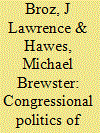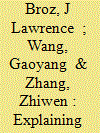|
|
|
Sort Order |
|
|
|
Items / Page
|
|
|
|
|
|
|
| Srl | Item |
| 1 |
ID:
072259


|
|
|
|
|
| Publication |
2006.
|
| Summary/Abstract |
We address the question of how international public goods are financed by analyzing voting in the U.S. Congress on legislation to increase the U.S. contribution to the International Monetary Fund (IMF). We argue that legislators are more likely to vote in favor of an increase (1) the more campaign contributions they obtain from banks that specialize in international lending, and (2) the greater the share of high-skilled "proglobalization" workers in their districts. The first argument supports the inference that a financially strong IMF mitigates the risks of international lending, to the benefit of the lending banks. The second reflects our claim that voters view the IMF as a positive force for global economic integration that-following Stolper-Samuelson reasoning-benefits high-skilled workers. Lastly, we analyze IMF loan decisions and find modest support for the claim that IMF policy reflects the interests of major international banks. Overall, our results suggest that private actors within the United States have individual stakes in funding the IMF.
|
|
|
|
|
|
|
|
|
|
|
|
|
|
|
|
| 2 |
ID:
172829


|
|
|
|
|
| Summary/Abstract |
We analyze the factors that increase the likelihood that other nations will follow China's global economic leadership. While our theoretical framework incorporates the conventional argument that China pulls in followers with economic benefits, we focus on grievances with the current global order that have the effect of pushing countries toward the rising new leader. We find that grievances about global financial instability are particularly important push factors. Our results show that countries that have experienced more financial crises, more variable capital account policies, more volatile portfolio capital outflows, and more social unrest during IMF programs are more likely to support China's global leadership than leaders of nations that have been less exposed to these problems. We find no evidence that grievances about global governance, or grievances about discriminatory US trade policies, are related to foreign support for China's global economic leadership. Overall, our evidence is consistent with the interpretation that leaders want to reform and preserve the WTO and the IMF, which have worked reasonably well for them under US leadership. At the same time, they have incentives to follow China's economic leadership on global capital flows, emphasizing long-term infrastructure and development finance over short-term flows which, under the current order, have imposed large costs on many economies.
|
|
|
|
|
|
|
|
|
|
|
|
|
|
|
|
| 3 |
ID:
178569


|
|
|
|
|
| Summary/Abstract |
A populist backlash to globalization has ushered in nationalist governments and challenged core features of the Liberal International Order. Although startling in scope and urgency, the populist wave has been developing in declining regions of wealthy countries for some time. Trade, offshoring, and automation have steadily reduced the number of available jobs and the wages of industrial workers since at least the 1970s. The decline in manufacturing employment initiated the deterioration of social and economic conditions in affected communities, exacerbating inequalities between depressed rural areas and small cities and towns, on the one hand, and thriving cities, on the other. The global financial crisis of 2008 catalyzed these divisions, as communities already in decline suffered deeper and longer economic downturns than metropolitan areas, where superstar knowledge, technology, and service-oriented firms agglomerate. We document many of these trends across the United States and Europe, and demonstrate that populist support is strongest in communities that experienced long-term economic and social decline. Institutional differences in labor markets and electoral rules across developed democracies may explain some of the variation in populists’ electoral success. Renewed support for the Liberal International Order may require a rejuvenation of distressed communities and a reduction of stark regional inequalities.
|
|
|
|
|
|
|
|
|
|
|
|
|
|
|
|
|
|
|
|
|